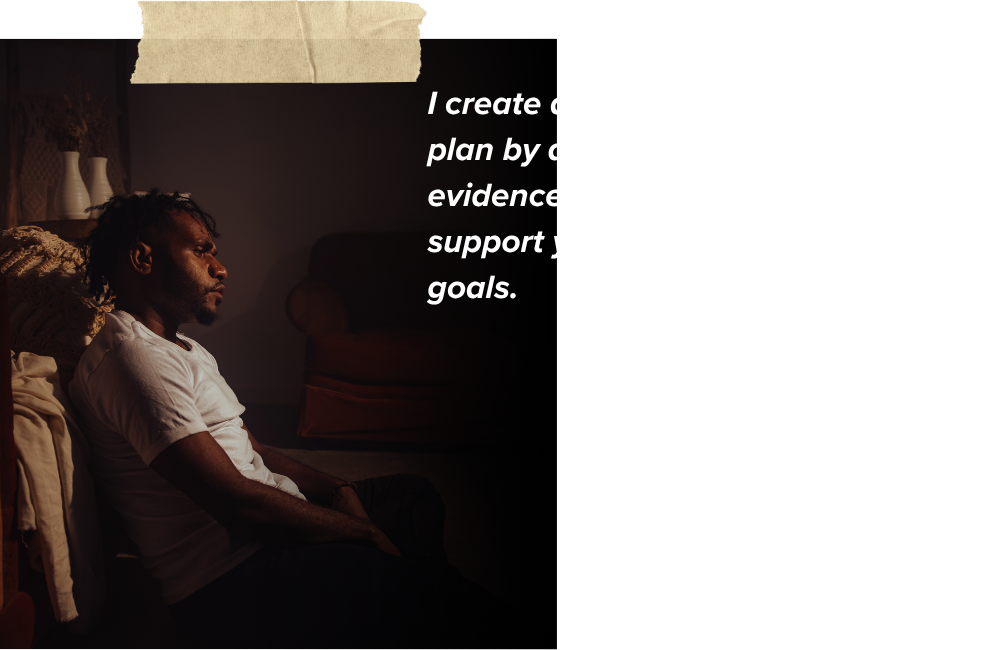Treatment Approaches

Personalized Therapy Treatments
Your story and experiences are unique, and your therapy should be too.

Your Partner in Healing and Personal Growth
Effective therapy is never one-size-fits-all, so I personalize every treatment plan by integrating the specific, evidence-based approaches that will best facilitate your healing.
My specialties include:

COGNITIVE BEHAVIORAL THERAPY
Cognitive-behavioral therapy (CBT) is a well-established, evidence-based form of psychotherapy that addresses a wide range of concerns by targeting the relationship between thoughts, emotions, and behaviors. It is effective in treating depression, anxiety, trauma, and relationship issues.
Progressive Muscle Relaxation or deep breathing exercises, along with exposure therapy, can help gradually reduce fear responses. CBT may also involve skills training in areas such as assertiveness and anger management. These techniques empower clients to break free from negative thought patterns, face their fears with greater confidence, and make meaningful, lasting changes in their lives.
I am drawn to CBT because it offers more than insight -- it gives people practical tools they can use in daily life. One of the most transformative moments in therapy is when someone realizes they don't have to be controlled by their thoughts. They can shift them, and in doing so, begin to feel more grounded, empowered, and free.
I have over two decades of training and experience in CBT.

DIALECTICAL BEHAVIOR THERAPY
Dialectical-behavioral therapy (DBT) is an evidenced-based form of psychotherapy that helps clients with concerns by providing tangible skills such as tolerating painful emotions, navigating conflict, and improving relationships. It helps validate and provides them with tools to work through their emotions. In relationships, DBT encourages clients to both accept and change, fostering healthy emotional expression and balancing control.
The core DBT modules include:
- Mindfulness Meditation: cultivating present moment awareness without judgment
- Emotion Regulation: understanding and managing emotions
- Distress Tolerance: learning to tolerate intense, painful emotions
- Interpersonal Effectiveness: building more stable and satisfying relationships
I am drawn to DBT because it blends validation with change, honoring where a person is while helping the build the skills to move forward. DBT is backed by extensive research showing its effectiveness for anxiety, depression, and trauma. Through the practice of dialectical thinking, clients learn to hold seemingly opposite truths, such as acceptance and change, at the same time. This process supports access to wise mind, a place where emotional insight and logical reasoning come together, allowing for more grounded, intentional decisions and deeper personal wisdom.
I have completed advanced DBT training and have experience co-leading DBT groups.

EYE-MOVEMENT DESENSITIZATION AND REPROCESSING THERAPY
Eye-movement desensitization and reprocessing (EMDR) therapy is a structured, evidenced-based trauma therapy that helps reduce emotional distress associated with past or future events and traumatic memories. EMDR is based on the idea that distress is caused by the brain's inability to fully process and integrate disturbing experiences. EMDR uses bilateral stimulation -- such as eye movements, sounds, or tactile buzzers or tapping -- to activate both hemispheres of the brain, facilitating integration of fragmented memories and support emotional healing. EMDR Therapy is backed by strong research and is recognized as an evidenced-based treatment for trauma, PTSD, anxiety, and other emotional difficulties.
I am drawn to EMDR therapy because it helps people heal in a way that is deep and lasting, beyond just talking about what happened. It is especially powerful for trauma, allowing the brain to reprocess painful memories so they no longer feel overwhelming. EMDR also incorporates somatic awareness, helping clients tune into sensations in their body and release trauma that is stored physiologically. This, along with emotional processing, helps clients move through stuck points, reclaim their sense of safety, and build inner resilience.
I have witnessed clients gain relief from long-held emotional wounds, often more quickly than expected. EMDR supports clients in feeling more empowered and in control, helping them respond to present situations with choice and clarity, rather than feeling reactive, overwhelmed, and trapped in old patterns rooted in past trauma.
With extensive experience in this modality, I have conducted over 1500+ EMDR therapy sessions. My training and certifications include EMDR Therapy I & II, Early Trauma Protocol, and Attachment-Focused EMDR.

CULTURALLY-SENSITIVE THERAPY
I strive to create a culturally responsive therapeutic setting by adapting both my behavior and treatment approach to be culturally aware and sensitive. My goal is to foster an empathetic and collaborative partnership, with a strong focus on how your cultural background may be shaping your experience.
Culturally sensitive therapy also entails exploring how societal injustices, systemic prejudice, and discrimination impact mental health across diverse communities and populations.
With extensive experience in this area, I practice from a foundation of cultural humility -- a stance of openness, respect, and ongoing curiosity toward others' cultural identities and lived experiences. I aim to create a space where clients feel truly seen, heard, and valued throughout the therapeutic process.

MINDFULNESS-BASED APPROACHES
Mindfulness meditation is the practice of bringing nonjudgmental awareness to the present moment experiences. By staying present and validating your current thoughts, emotions, and physical sensations, you create the opportunity to respond with intention and choice, thus fostering an internal mechanism.
Mindfulness helps us to more clearly observe our inner worlds, be more grounded, and live a more challenging life -- but the key is that we're learning to do so with greater acceptance and ease. This means that we do not expect to excel at a new sport on the first try, psychological or procedure -- such as mindfulness require practice to see real benefits.
